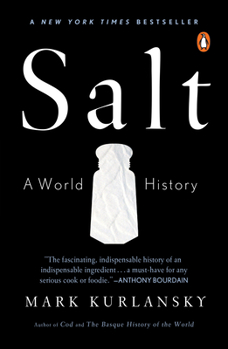Salt: A World History
Select Format
Select Condition 
Book Overview
"Kurlansky finds the world in a grain of salt." - New York Times Book Review An unlikely world history from the bestselling author of Cod and The Basque History of the World Best-selling author Mark Kurlansky turns his attention to a common household item with a long and intriguing history: salt. The only rock we eat, salt has shaped civilization from the very beginning, and its story is a glittering, often...
Customer Reviews
Surprisingly Fascinating
Trade in salt and salted foods shaped economies for centuries
Salt is not just food
Salt shook up my thinking...
Kitchen Confidential X Two
Salt: A World History Mentions in Our Blog

Back to school time means beach reads come out of your bag and textbooks go in, but that doesn't mean the fun is over. While we (obviously) embrace all things learning and reading (because books), even we have to admit that some textbooks are a bit, um...dry. To ease the transition, here are 22 alternative academic titles that are entertaining, practical and, well, educational.







